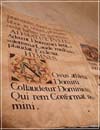

|
 |

What a Friend We Have in Jesus
Proverbs 18:24
CONVERSE | Hymn History | Bible Passage
|
Author: |  |
Joseph Scriven, 1819-1886 |
|
Musician: | |
Charles C. Converse, 1832-1918 |
 |  Play MP3 • Click to listen to the music for this hymn. Play MP3 • Click to listen to the music for this hymn.
|
What a Friend we have in Jesus,
All our sins and griefs to bear!
What a privilege to carry
Ev'rything to God in prayer!
O what peace we often forfeit,
O what needless pain we bear,
All because we do not carry
Ev'rything to God in prayer!
Have we trials and temptations?
Is there trouble anywhere?
We should never be discouraged:
Take it to the Lord in prayer.
Can we find a friend so faithful,
Who will all our sorrows share?
Jesus knows our ev'ry weakness:
Take it to the Lord in prayer.
Are we weak and heavyladen,
Cumbered with a load of care?
Precious Saviour, still our refuge—
Take it to the Lord in prayer.
Do thy friends despise, forsake thee?
Take it to the Lord in prayer;
In His arms He'll take and shield thee,
Thou wilt find a solace there.
|


|
 |
HYMN HISTORY:
Only the Lord and the man in question really know what burdens of sorrow and affliction were heaped upon the writer of this great hymn. One thing we do know, however, is that this beautiful and blessed hymn would never have been penned if the author had not known such trouble.
The man was Joseph Scriven and he was bom near Banbridge, in the heart of the rolling hills of County Down, Northern Ireland.
After graduating from Dublin's famous 'rrinity College' he seemed set for a brilliant career and a happy life for he was also engaged to be married.
But then tragedy struck! His fiancee was accidentally drowned on the very eve of their wedding and Joseph Scriven was plunged into his first great experience of sorrow. In the providence of God it was this tragedy which brought him to a personal knowledge of Jesus Christ.
In 1845 Scriven sailed for Canada to start life anew and, hopefully, to leave all his sorrows behind. But it was not to be, for ill-health dogged him and he was forced to return to Ireland after only two months.
Two years later he again set sail for Canada to take up a teaching post. In this he was successful and later graduated to the position of private tutor to the children of a military captain.
Life, at last, seemed worth living and prospects were continually improw ing!
Again he met and fell in love; this time with a charming young woman of twenty-three. Soon they were engaged to be married.
However, bitter disappointment was once more to be his unhappy lot, for this young lady was suddenly stricken with a serious illness and died before their marriage vows could be solemnise&
Cheated, for the second time, out of the prospects of a happy marriage by the cruel hand of death Scriven, quite naturally, became the victim of severe depression and declining health. But despite all this he never gave up his personal faith in the Saviour.
By this time he had settled in Port Hope, Ontario, and was manager of a small dairy there. He became known as the local 'C_,ood Samaritan', helping the poor and under-privileged, sharing his food with the needy and often giving them clothing.
However, all these good deeds may well have been forgotten if Joseph Scriven had not written twenty-four lines of poetry to comfort his mother who was suffering from a serious illness.
Through his trials and afflictions Scriven had come to know the Lord in a very personal way, not only as Saviour but also as a friend.
Thus, from the heart he could write:
What a friend we have in Jesus,
All our sins and griefs to bear,
What a privilege to carry,
Everything to God in prayer.
As I say, Scriven wrote these words to comfort his ageing mother at a time of illness. He had not seen her since he had said 'goodbye' over ten years before and wasn't able to make the long journey back home to be with her.
So he wrote What A Friend We Have In Jesus, and sent it with the prayer that it would remind her of 'the never failing friend,' Jesus Christ. I'm sure it did.
Joseph Scriven nevor in tended his poem to be published but a friend who visited him during his last illness discovered the lines and asked 'Who wrote these beautiful words?' Scriven's modest reply was 'the Lord and I did it between us.'
Soon it was published in The Port Hope Guide, a local newspaper. Remarkably, a copy of that newspaper was used to wrap a parcel destined for an address in New York City. when the recipient unwrapped his parcel he caught sight of Scriven's poem and arranged to have it published.
Eventually, it was seen by German-American composer, Charles Converse and very soon his simple, plaintive melody gave wings of song to Joseph Scriven's telling words.
Thus an Irish-Canadian and a German-American were used of God to bring blessing and encouragement to millions.
BIBLE PASSAGE:
24 ¶ A man that hath friends must shew himself friendly: and there is a friend that sticketh closer than a brother.
|
|



